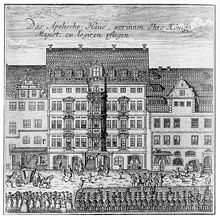Praise your luck, blessed Saxony
| Bach cantata | |
|---|---|
| Praise your luck, blessed Saxony | |
| BWV: | 215 |
| Occasion: | Festival music for the electoral Saxon house |
| Year of origin: | 1734 |
| Place of origin: | Leipzig |
| Genus: | Tribute music |
| Solo : | STB |
| Choir: | SATB |
| Instruments : | 3Tr Ti 2Ft 2Ob 2Vl Va Bc |
| AD : | approx. 37 min |
| text | |
| Johann Christoph Clauder | |
| List of Bach cantatas | |
Praise your luck, blessed Saxony ( BWV 215) is a secular cantata by Johann Sebastian Bach .
Emergence
The cantata was on the occasion of a visit by the Saxon Elector and Polish King August III. premiered in Leipzig on October 5, 1734. The visit, announced at short notice, was used by the students of the Collegium musicum of the University of Leipzig to perform evening music for the prince as part of a festive torchlight procession in front of the Apel house where he was staying. The text was written by the Magister Johann Christoph Clauder . Bach had very little time to compose, possibly only three days. It is therefore assumed that he resorted to existing works in the parody procedure. However, in this case it would only have to be a question of lost pieces, since the sheet music used cannot be proven in any other Bach composition. It is likely that the opening choir is a parody of the proven but lost congratulatory cantata Es lebe der König, der Vater im Lande (BWV Anh. 11), which was composed two years earlier on the name day of August the Strong .
The event of the premiere is also linked by the chronicler of the city of Leipzig with the death of the important trumpet soloist Gottfried Reiche , who collapsed on the street the day after the festivities, which caused his contemporaries to "strain the blows" the day before "at the royal Musique ”.
Subject
From the baroque homage and congratulatory cantatas, which almost always uncritically praise the fame and wisdom of the regent, Praise Your Happiness, Blessed Saxony , stands out insofar as the ruler is not only praised in general or with reference to ancient mythology , but the poet specifically refers to recent historical events: After the death of August the Strong a year and a half earlier, August III. did not come to the Polish throne without resistance; first he had to defeat his adversary, the Polish rival king Stanislaus I. Leszczyński , who fled to Danzig , which he succeeded on July 6, 1734 with the surrender of Danzig. The poet refers to these events when he speaks of "Sarmatia" (meaning Poland) or the "entire north" which was "satisfied by Augustus'" election of a king.
occupation
- Vocal soloists: soprano , tenor , bass
- Choir: soprano, alto , tenor, bass
- Orchestra: trumpet I-III, timpani , transverse flute I / II, oboe I / II, violin I / II, viola , basso continuo .
particularities
As is often the case in the Baroque era, the royal power is represented musically by kettledrums and trumpets and gives the work its solemn shine. It is striking that the opening movement is designed as a double choir, i.e. eight-part. Years later, the music of this movement was used again in the Osanna in excelsis of the B minor Mass . The soprano aria With the weapons kindled by zeal , Bach also reworked my sinister senses for the Christmas oratorio for the bass aria Enlighten . Most of the recitatives are unusually elaborate : in the final recitative movement, the three solo parts are accompanied by all the instrument groups used in the orchestra. In the section assigned to the bass part, timpani and trumpets are impressively used for interjections that onomatopoeically depict the horrors of war.
See also
literature
- Alfred Dürr : Johann Sebastian Bach: The Cantatas. Bärenreiter, Kassel 1999, ISBN 3-7618-1476-3
- Werner Neumann : Handbook of the cantatas JSBachs . 1947. 5th edition 1984, ISBN 3-7651-0054-4
- Hans-Joachim Schulze: The Bach Cantatas: Introductions to all of Johann Sebastian Bach's cantatas . Evangelische Verlags-Anstalt, Leipzig, ISBN 3-374-02390-8 (Edition Bach Archive); Carus-Verlag, Stuttgart 2006, ISBN 3-89948-073-2
- Christoph Wolff, Ton Koopman : The world of Bach cantatas . Verlag JB Metzler, Stuttgart, Weimar 2006, ISBN 978-3-476-02127-4
Web links
- Data, text and sources at Bach Digital
- Score on IMSLP
- Structure and complete text of the cantata


